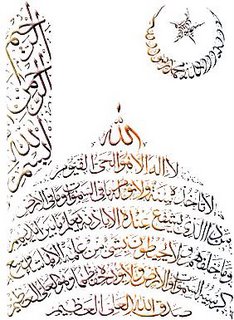Adil Najam
 I write these lines as midnight strikes in Pakistan on the night between 9th and 10th Moharram. I write these lines as the news on television flashes news about blasts and bombs all around. How much more poignant could the message of Ashura be than it is today? Each year, it seems, the message of Ashura becomes more poignant and more important than the year before. But each year, it also seems, that the message becomes less understood. Each of us has to understand what that message means to us. All I can do today is to repeat my own understanding, in the very same words I had used the last two years.
I write these lines as midnight strikes in Pakistan on the night between 9th and 10th Moharram. I write these lines as the news on television flashes news about blasts and bombs all around. How much more poignant could the message of Ashura be than it is today? Each year, it seems, the message of Ashura becomes more poignant and more important than the year before. But each year, it also seems, that the message becomes less understood. Each of us has to understand what that message means to us. All I can do today is to repeat my own understanding, in the very same words I had used the last two years.
To me, Ashura commemorates a struggle that is steeped in deep spiritual meaning, not only for Islamic history but for all humanity. It is a struggle between good and evil, between just and unjust, between weak and powerful, between immediate and the eternal, between principle and ambition. The power of Ashura is not only in the epic events that it commemorates, it is in the narrative of those events, in the symbolisms that we construct. Ultimately, it is in the meanings that we derive from those events.
Muharram is, of course, of special significance to Shias. But the events and meaning of Ashura is of significance and relevance to all Muslims, and I would suggest, to all humans everywhere.
Like so many others growing up in a Sunni household I grew up observing ehteram-i-Muharram and am always drawn in these days leading up to Ashura towards thinking about the meaning of religion and of faith. To me these have always been days of deep spiritual reflection; especially of intellectual enquiry into the meaning of justice (the concept of ‘adl’ holds a deep significance to me given the name I was given at birth and therefore I have always interpreted Ashura particularly as a time to reflect on what justice is).
Growing up, the night of Ashura was always defined for me by the Majlis i Shaam i Gharibaan (often by Allama Naseer ul Ijtihaadi) on PTV on the night of dasveen Muharram, which was followed immediately – and at right about midnight – by Syed Nasir Jahan’s soulful recitation of Salam-i-Akhir.
Bachay to aglay baras hum hain aur yeh gham phir hai
Today, as I listen to him again, so many more layers of meaning unfold. So many deep wounds open up. So many new thoughts come flooding in. And, yet, I have nothing new to say. Maybe you can share what the message of Ashura means to you in a world that continues to be unjust and unjustly violent?




















































-Where is concept of Khilafat in Quran?….
Surah 8 Al Anfâl v.73. And those who disbelieve are allies to one another, (and) if you (Muslims of the whole world collectively) do not do so (i.e. become allies, as one united block with one Khalifah – chief Muslim ruler for the whole Muslim world to make victorious All�h’s Religion of Isl�mic Monotheism), there will be Fitnah (wars, battles, polytheism, etc.) and oppression on earth, and a great mischief and corruption (appearance of polytheism).
Iqbal says:
“Hoon Mureed-e-Khandan-e-Khufta-e-Khak-e-Najaf
Mauj-e-Toofan aap laey jai gee sahil per mujhe
Hey mujh bey amul key dil main dagh-e-ishq-e-Ahl-Bayt
Dhoondta pirtha hey Zil-e-Daman-e-Haider mujhe
Ronay wala hoon Shaheed-e-Kerbala key gham men main
Kiya durey maqsad na dengey Saqiy-e Kausar mujhe”
Iqbal was a big admirer of Ahl-e-Bayt and his persian as well as urdu kalam testifies to that. As is clear from this above verse and other verses in Persian he believed in weeping over the Shahadat-e-Imam Hussain. As is clear from the above verse he takes pride in his act of weeping and believes that his tears will recompensed in the hereafter.
So, Adnan, where was that sheyr that yo quoted as being from Iqbal, really from… and do you want to apologize for lying?
Maybe not, since the enemies of Islam habitually lie to present hatred in the name of religion!
Would like to conclude on What Iqbal had said about a Muslim’s thinking of modern world:
اپني ملت پر قياس اقوام مغرب سے نہ کر
خاص ہے ترکيب ميں قوم رسول ہاشمي
ان کي جمعيت کا ہے ملک و نسب پر انحصار
قوت مذہب سے مستحکم ہے جمعيت تري
دامن ديں ہاتھ سے چھوٹا تو جمعيت کہاں
اور جمعيت ہوئي رخصت تو ملت بھي گئي
@Ben Castle:
Yes for you Iqbal preached hatred when he wrote Jihad by writng “Tariq Ki Dua” and slaped beliefs like Barelviat and Suffism after saying “Haqiqat Riwayat mey Kho gai hay….Yeh Ummat Khurafat mey kho gai hay”. Because people who have read Iqbal’s famous “Deen-e-Mullah Fe Sabil-e-Fasad”(and never bothered to find out it’s origin), they ignorantly believed that Iqbal was a secular person. When a learned like you talk like that then I fail to find any legitimate excuse to curse those jahil religious clerics who try to mold Islam according to their own preferences.
Iqbal and Jinnah knew Quran & Islam more than you and me. Trust me. Read them and you will regret why did you make a mistake to misunderstand them as a “anti-religion” elements.
@Saadia: mame, for you every other person is a Taliban if he/she debunks lame theories and arguments?